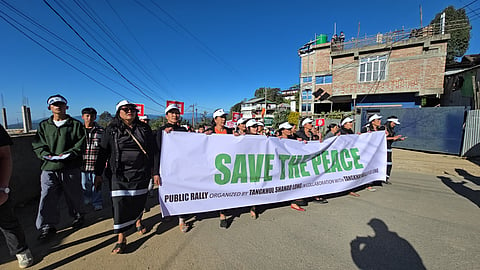

UKHRUL: Calls for “Save the peace” echoed across Manipur’s Ukhrul town on Friday as Tangkhul Naga women peacekeepers, known as “pukreilas,” rallied for peace amidst growing tensions over the unresolved Naga political issue.
This rally came days after National Socialist Council of Nagalim (NSCN-IM) general secretary Thuingaleng Muivah warned of a return to violence should the Centre reject their proposal for third-party intervention.
Organised as part of the golden jubilee celebration of Tangkhul Shanao Long (TSL), the apex body of Tangkhul Naga women, the rally culminated in a public meeting at a local ground.
“We, Tangkhul women, are peacebuilders. Traditionally, we have been known as Pukreila, which means peacekeeper. We want peace in the Naga homeland and across the country,” said TSL president Thingreiphi Lungharwoshi.
She added, “We deserve peace, and it is our right to assert it. We organised the programme to save peace. We want the Government of India to recognise the peace initiative of the Nagas.”
The event was attended by Naga leaders from various states and Myanmar. Concerns were raised about the enforcement of the Armed Forces (Special Powers) Act (AFSPA) in Naga areas, the proposed India-Myanmar border fencing, and delays in resolving the Naga political issue.
Lungharwoshi reflected on TSL’s origins, recounting, “The TSL was born in 1974 after Rose Ningshen, a Naga girl, was raped by BSF personnel. We faced numerous atrocities due to the enforcement of AFSPA. Women are tired of the oppressive sanctions and tactics imposed by the Government of India on the Nagas and their land.”
She urged sincerity from the Indian government, stating, “It is time that the Naga political issue is settled. We want the Government of India to respect our rights. As our history is unique, the solution also has to be unique.”
Naga Women’s Union president Priscilla Thiumai echoed similar sentiments, asserting that peace across the Northeast hinges on resolving the Naga issue. “Nagas were always free people. We are waiting for our final destiny – the solution to the Naga political issue. The Government of India should respect our desire,” she said.
Questioning AFSPA’s presence in peaceful Naga areas, she demanded, “There is militarisation in the Naga-inhabited border areas. AFSPA should be repealed from there.”
The Tangkhul Katamnao Saklong (TKS), a student body, emphasised the emotional weight of the issue. “Nagas are peace-loving people. Our leaders respect the Indian government, but often our faithfulness and sincerity are taken as weaknesses,” said TKS president Ramreichan Keishing. “The huge gathering today sends a loud and clear message to the world that the Nagas carry this issue in their hearts.”
'No Indo-Myanmar Border in Naga Homeland'
Neingulo Krome, secretary general of the Naga People’s Movement for Human Rights, rejected the notion of an Indo-Myanmar border in the Naga homeland.
“With or without the free movement regime, there is no Indo-Burma or Indo-Myanmar border in the Naga homeland,” he said. “There may be a Burma-Naga border somewhere in the Chindwin River. There is another, Indo-Naga border, towards the Brahmaputra. There is no Indo-Burma border between these two rivers.”
Krome accused colonial powers of dividing the Naga homeland, adding, “The Britishers divided the Naga homeland, and India and Myanmar occupied it. But we are one people, and the idea that there is a border in the middle of Naga homes and villages is a wild imagination.”
He expressed confidence in the Nagas’ readiness to resist such “repressive ideas and laws of the Government of India.”
Hashokmi Chadirung, a Naga leader from Myanmar, criticised the border fencing initiative, stating, “The Indian government decided to fence the Myanmar border to further separate the Nagas. We are divided into two countries, but we are one. We have been together for generations. The fencing will deepen the divide.”
This collective call for peace and justice reinforces the Nagas’ long-standing struggle for recognition and resolution of their political aspirations.